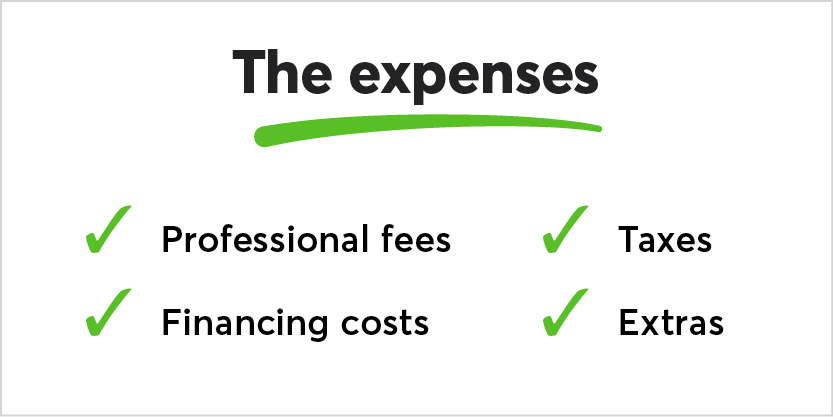

What are the expenses involved in buying a home?
Published on September 9, 2022

Buying a house has a number of associated costs. Some are one-time expenses, while others are recurring and will need to be factored into your monthly or yearly budget.
Whether or not you’re buying your first home, it’s important to understand what expenses await, to avoid being caught short. Sound planning is the key to becoming a homeowner stress-free. Here are 15 expenses to consider when buying a home in Quebec.
Summary:
Desjardins Tips
How much should you borrow for a house?
Calculating your borrowing capacity allows you to determine the maximum you can borrow to buy a house. However, it's wise to choose a property whose price is in keeping with how much you can realistically afford so you can maintain your current quality of life.
Percentages to keep in mind
- No more than 32% of your gross household income should go toward home expenses (mortgage payments, home insurance, utilities, etc.)
- No more than 40% of your gross household income should go toward paying back your financial commitments (mortgage payments, auto loans, student loans, etc.)
Calculate how much you can afford to spend on a home.

Professional fees
1. Building inspector
While getting a property inspection isn’t mandatory, it is strongly recommended, to help prevent unpleasant surprises. An inspection will reveal any major apparent issues, help you plan short-, medium- and long-term renovations and, ultimately, allow you to negotiate the selling price. Usually, to protect themselves, buyers make their offer to purchase conditional on receiving a favourable inspection.
Inspections generally cost $500 and up, depending on the property type.
2. Chartered appraiser
Financial institutions sometimes require a professional appraisal before granting a mortgage. It can also be done to determine the property’s market value before buying it.
Depending on the building and location, a chartered appraisal will cost $500 or more.
3. Notary
The final step in every real estate transaction in Quebec takes place at the notary’s office. It is the buyer who selects the notary who will prepare the deed of sale, register it in the land registry and make all the necessary verifications. The buyer also pays most of the transaction fees and costs.
It is difficult to estimate the total cost of this transaction because the Chambre des notaires du Québec doesn’t impose fees, so these can vary depending on the property type and the region in which it is taking place. However, the fee agreement or professional contract will set out the costs relating to the transaction. If any changes occur, the buyer must be informed throughout the process.
The final bill for this stage of the purchase can easily exceed $2,000.

Financing costs
4. Down payment
If you want to buy a property in Canada, you’ll need to provide at least 5% of the purchase price in cash, However, under some conditions, first-time buyers can withdraw part of their RRSPs without being taxed, thanks to the Home Buyers’ Plan (HBP).
Desjardins Tips
A savings strategy to increase your down payment
Saving up thousands of dollars for a down payment on your first home requires a lot of discipline. Here's a simple savings strategy to help you get there:
- Open a separate savings account, and call it "Home"
- Add up all the recurring expenses you anticipate for your future home
- Subtract your current regular expenses from this amount
- Save an amount equal to the difference between the 2, using automatic transfers
This way, you'll get used to your future cost of living while setting money aside to reach your goal. If you can afford to save more, then go ahead!
5. Mortgage loan insurance
If you make a down payment that is less than 20% of the purchase price, you will need to purchase mortgage loan insurance from the Canada Mortgage and Housing Corporation (CMHC). The only way to avoid this expense is to save up a large enough down payment.
6. Mortgage penalty
Divorcing, having a child, changing jobs: there are many reasons why you might need to take out a new mortgage or cancel the current one before the end of its term. Just be aware that there will be a penalty for doing so. The amount will depend on the lender and on the conditions of the loan agreement, but it could be several hundred or even several thousand dollars.
Desjardins Tips
Special measure in case of a breakup
You can use the Home Buyers' Plan (HBP) under certain conditions if your marriage or common-law partnership ends. Thus, even if you've been an owner in recent years, you could withdraw up to $35,000 from your RRSP without having to pay taxes the withdrawal year, in order to:
- Buy a new home
- Buy out your ex-partner's share of the family home
Discover other little-known RRSP tax advantages.

Taxes
7. Welcome tax
You can expect to receive a bill for the real property transfer tax, also known as the welcome tax, from your municipality a few weeks or months after the deed of sale is signed. This tax is calculated from the higher of the two following amounts:
- The purchase price paid, or
- The value of the property according to the municipal assessment
Find out more about how this tax is calculated (site in French only).
The welcome tax is paid only once, and the amount will depend on the municipality and the property value. Some first-time buyers and families may qualify for subsidies.
8. Municipal and school taxes
Based on the value of the residence and its property, municipal taxes are used to pay for such services as wastewater treatment and the water supply and sewer systems. School taxes pay for some of the school board’s activities, like administration of its educational establishments, maintenance of the buildings and a portion of school transportation costs.
Both of these taxes are recurring expenses. You will receive a bill every year.
9. Sales tax (GST and QST)
The Goods and Services Tax (GST) and the Quebec Sales Tax (QST) apply on the purchase of new homes and those sold by a business. The GST is 9.975% and the QST is 5%, for a total of 14.975% on the selling price. However, buyers can request a refund of these taxes on a new home if they meet certain eligibility criteria (site in French only).

Extras
10. Home insurance
A good home insurance policy protects your property and belongings in the event of an incident like fire or theft. It often also includes civil liability, which protects against any damage to another person or their belongings caused accidentally by the homeowner.
Note that home insurance may increase substantially when you go from being a tenant to a homeowner.
11. Condo fees
If you are purchasing a condo, there will be a monthly fee payable to the condo association, to cover building maintenance and for a contingency fund.
12. Moving costs
Don’t make the mistake of underestimating the cost of moving. Whether you hire a moving company or rent a truck and have friends help, moving is rarely free. Even if you keep the same cable and Internet providers, they may charge a move or reconnection fee.
13. Settling in and renovations
Getting set up in a new place often leads to purchases of furniture or appliances. And when it’s your first home, the expenses are even higher. Think about what you might need for the yard, like a lawnmower, a snowblower or patio set! These are often overlooked.
Sometimes minor work or even major renovations are needed. Updating the bathroom and giving all the rooms a fresh coat of paint can add up to a substantial investment. And what if something unforeseen comes up? The bill can add up very quickly!
14. Recurrent services
You often will have to review your budget for electricity, hot water and heating when you move, as these depend on the type of building. For instance, a three-storey ancestral home in the country will be much more expensive to heat than a recently built condo in downtown Montreal. And don’t forget that the price of telecommunications (Internet, TV, cellphone) varies by region.
15. A new lifestyle
Sometimes, changing homes can mean changing lifestyles too. Getting away from downtown may involve buying a car, public transit passes or just a higher fuel bill. Some people may also need to face a transition period at work. All these changes have a cost that should be considered before making the jump and buying a house.
Buying a house: Checklist of expenses
Getting your very own cozy nest can be more expensive than you may have imagined. Some people will be surprised that the expenses on top of the cost of the house can be in the thousands.

It’s best to be prepared! Get out the calculator or make an Excel spreadsheet before starting to search for a home, and long before heading to the notary’s office. Being informed and respecting your budget are key to making your dream a reality.
Need help to sell before buying? The DuProprio team supports you until you sell. To achieve your dream broker-free, watch our webinar now!
This content was written in partnership with Desjardins.
